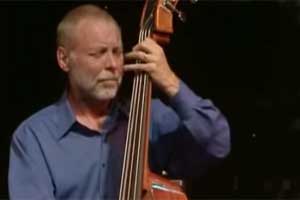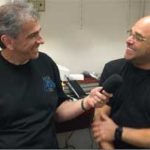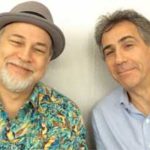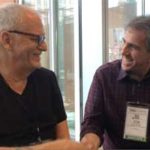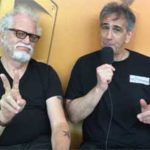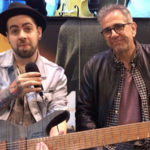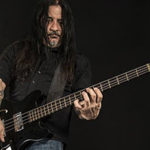Bass legend tells FBPO his whole story, from the early days to playing with Miles Davis, solo career and much more
Exclusive interview with FBPO’s Jon Liebman
September 2, 2013
Dave Holland is a legend in the music world. The Wolverhampton, England native has performed with a veritable who’s who of jazz royalty, including music icon Miles Davis, with whom Holland played during the trumpeter’s epochal Bitches Brew period. Dave has also performed with Anthony Braxton, Stan Getz, Cassandra Wilson, Jack DeJohnette, Chick Corea, Joe Henderson, Thelonious Monk, Betty Carter, Pat Metheny, Kenny Wheeler, Bill Frisell, Roy Haynes, Herbie Hancock and many others.
Holland has released a number of highly-acclaimed solo albums, as well. His latest effort, Prism, is due September 3, 2013, on Dave’s own label, Dare2 Records.
FBPO: Tell me about your musical upbringing.
DH: My first recollection of connecting with music was when I was about 4 or 5 years old. I was living with my grandparents, my mother and my uncle. My uncle had a ukulele and showed me some chords on it. We had a piano in the front room of the house and I used to sit and play that, picking out songs on it. My mom and my grandmother played at special occasions. We had a radio in the house, but no record player or anything. There wasn’t a whole lot going on.
Whatever music was around I kind of gravitated towards. And then of course skiffle and rock & roll got introduced to the music scene in England. This was in the middle ’50s, when I was about 9 or 10, that I started getting interested in Buddy Holly, Little Richard and all the music that was coming out of the states.
FBPO: How did you become a bass player?
DH: I was given a guitar when I was 10 and I started playing that. I connected up with a few friends at school who played guitar and we put a band together when I was 13. We had three guitars, a singer and a drummer and we decided we needed a bass player. That’s when I volunteered to play the bass.
FBPO: You got a pretty early start on your career, didn’t you?
DH: Yes. I left school when I was 15 and I’d moved on to another band. We were working a lot around the Midlands area, around Birmingham, in England, playing dance halls and clubs. I also got to accompany some musicians like Chet Atkins, Jerry Lee Lewis and people who were over in England doing singles. We eventually landed a TV show once a week where we were the backup band for whoever was coming on the show to plug their record.
FBPO: I assume this was all on the electric bass?
DH: This was all on the electric bass, exactly. I had a Fender bass and that’s what I was interested in, but when I left school at 15, I’d started listening to jazz. There had been sort of a New Orleans jazz revival in England and I loved the sound of that music. I still had an interest in guitar, too. Somebody told me about Django Reinhardt, so I listened to Django Reinhardt records and Charlie Byrd.
When I was still around 15 or 16, I was reading Downbeat magazine, looking for bass players. I couldn’t read music much at that point, so I was looking to see what else could be done with the bass. They happened to have a poll in that issue of Downbeat and Ray Brown was at the top of the poll. I’d never heard of him or heard any of his music, so I went to the record store, looking for records with Ray Brown and of course I came across the Oscar Peterson Trio. The two records I bought were Night Train and Affinity, two wonderful albums.
When I was in the store, I was flipping through the records and I saw a bass player on the front of two records and it was Leroy Vinnegar. There was a record he made called Leroy Walks and the second volume, Leroy Walks Again, on Contemporary Records. I took these four records home, put them on my little record player and the sound that came out of the record player just blew me away! I was like, “My goodness! So that’s what playing the bass is about!”
FBPO: Was that the start of your transition to upright bass?
DH: Yes. In fact, within a few weeks, I went to the music store and got myself a plywood bass, brought it home and started practicing with the records. I continued playing bass guitar until I was about 17. At that point, the band I was in got a chance to go to Hamburg, to play in one of the clubs there, which was often a route that English bands took. The Beatles had done it and other bands. It was a chance to play four sets a night and really get your music together. The band had an opportunity to do it, but when we got the contracts, it said you had to be 18 to work at the clubs. I was only 17, so I couldn’t go. They took another bass player and left me kind of, you know, high and dry at the beginning of the summer. This must have been ’63, I guess.
FBPO: I think the same thing happened to George Harrison in Hamburg. Somehow they managed to sneak him in, though!
DH: I didn’t know that. How about that! We didn’t do that. I guess we were trying to be too correct or something. But that’s what happened.
I had been going to some jazz clubs and at one of the clubs I’d been going to, there was a tenor player and I went up to talk to him after the set. He was an older man – older than me, anyway! He was in his late 20s, I think. I said I play bass guitar, but I’m playing a little acoustic bass as well now. He said he was taking a big band to one of the summer resorts up in the north of England and that he needed a bass player.
The next night, I went to a rehearsal and he gave me a book of music with about 300 tunes in it! It had all these standard big band arrangements and a few Basie and Ellington things. Luckily, most of them had chord sequences written above, so I was able to get through it and kind of figure out what was going on. I still couldn’t really read the details, but he gave me the gig anyway. He liked my spirit and liked what I was doing at the time.
I spent three months doing that, just learning to read this book of music. We did an afternoon concert, playing Sousa marches and things in a kind of band shell situation outside. I was playing the tuba parts on the bass, so it gave me a chance to really work on it. I worked hard every day on learning to read this music.
FBPO: What happened after that?
DH: At the end of that summer season, somebody came around to the ballroom where we were playing and said they were looking for three musicians to join a tour that was going around England, backing a singer called Johnny Ray. He was a crooner that was kind of popular, an American singer who had a few hit songs in the early ’60s. I got that gig and we set off on a four-week tour around England, Ireland and Scotland.
The tenor player in that band was a Greek man who was starting a gig at a restaurant in London and needed a bass player. So at the end of that tour, he asked me how I felt about moving to London and playing in this Greek restaurant he was starting to work in. It was six nights a week.
I decided to make that my next move, to go to London to try to make my way in the London scene as a musician. I had no real thoughts about being a jazz musician at that point. I was just a working musician, doing whatever gigs I would get called for. And I was trying to get as much experience in as many different ways as I could.
I did that gig six nights a week. On Sundays, I found a rehearsal band that I could play with. I did that for a year and, during that year, I started studying with a great classical teacher, James Merritt, who was the principle of the London Philharmonic Orchestra. Later on, he went on to be the principle in the BBC Symphony. This was my first chance to really study with somebody and he was a real teacher and a really fine player.
FBPO: French or German bow?
DH: It was French bow. At that time, the tradition in England was all French. We started a weekly lesson and towards the end of that year, in the spring of ’65, he suggested that maybe I’d like to apply for a full-time three-year performance course at the Guildhall school. I did auditioned for the school and for a scholarship from the government. I passed both auditions, got accepted to the school, a small stipend to live on and my tuition paid.
I started in the fall of ’65, studying for three years at the Guildhall. During the evenings, I just started doing whatever gigs I could, which were mostly jazz gigs. A lot of the first gigs I got were with sort of New Orleans-style bands, playing King Oliver and Louie Armstrong arrangements. I got slowly connected to other musicians, getting recommended and playing with all kinds of different bands, quartets, big bands and everything.
I was thinking I would like to develop my playing so I could work as a studio musician. I was trying to learn as much as I could about music. I thought it would be interesting, playing different music every day. One day it would be a film score, another day it would be a jingle, another day would be a jazz trio on the BBC radio. In those days, they used to have programs like that.
FBPO: This is all on the upright now?
DH: This is all on the upright. When I moved to London in ’64 to play in the Greek restaurant, I stopped playing electric altogether. By ’66, I was starting to do all kinds of different things, but the jazz part of my activities was starting to really get into my heart. That was beginning to be the thing I was really feeling passionate about as a musician. I started doing more and more quality gigs, playing with better players and so on. I met some of my peers, like John Surman, Evan Parker and Kenny Wheeler, who was one of the great players on the British scene at that time.
FBPO: This was all happening while you were still a student?
DH: Yes. In ’66, I went for a summer program, an orchestra thing, playing an all-Bartok workshop. I was principle of the orchestra at school by that time, so they took the best players out of all the schools and put them together in one orchestra. We spent the summer playing Bartok. I’m telling you this because the end of the summer was a kind of a turning point for me. I love Bartok’s music and the experience of playing with such an outstanding collection of musicians was great. We had a wonderful conductor, who just brought the music alive. I came back in a bit of a creative crisis. I was like, “What can I do that would ever match that? I’ve got to decide what I’m going to do.”
I saw this as being a sort of crossroads, where I had to decide what I was going to make my commitment. When I came back to London, I talked to my friends and, after some thought, I said to myself, “Well, the music that I play that’s most personal is the jazz music. What I can do may never reach the heights of what I’d just done with this orchestra, but at least it’s my music and I can put myself into it and I can express myself to the fullest extent that I’m able in that context.
That was sort of the turning point. I think within a month, I got a call to start working at the Ronnie Scott club. It was one of those signals that you get in your life, when you make a decision and a commitment to something and suddenly you get a reply back from the universe, saying, “Okay. Here! Now you’ve made that commitment. Here’s something to carry you forward.”
I started working at Ronnie’s and playing with some great musicians, like Ben Webster, Coleman Hawkins and Joe Henderson, and it elevated me. Suddenly I was really doing some things that were so inspiring. Along with that, there was a club in London that used to be the Ronnie Scott club before he moved to the new location, where it is now. The old location had some time left on the lease and Ronnie, the caring person that he was about the music and everything, decided that he’d let all the young musicians in London have access to this place to put on music seven nights a week. We could rehearse there and we’d hang out there after hours when the club was closed. We’d be there until the early hours of the morning, playing.
So much got done in that club! I was playing sometimes at the old place and sometimes I’d be working at the main club. Sometimes I’d work at the main club and, after everything was finished, go to the old place to carry on and play jam sessions. I was just playing all the time. I had a bass in my hands many hours a day. I think it was something that really accelerated my whole development, that whole period in London.
FBPO: How did the Miles Davis gig come about?
DH: In 1968, I was working at Ronnie’s and Miles came in. I was just accompanying a singer. I say “just” because I wasn’t playing any of the sort of more cutting edge music that we were all working on at that time. We were following the directions that Ornette was following and Trane and Miles. It was a nice gig I was doing, good singer, good piano trio.
It was a standard kind of situation and Miles came into the club. I was there opposite the Bill Evans trio. Bill was there with Eddie Gomez and Jack DeJohnette. I didn’t think anything of it. I didn’t think Miles would even be listening to us, but at the end of the night, I got a message from Philly Joe Jones, who was living in London at that time and was in the club that night. He came up to the stage and said, “Hey, Dave, Miles wants you to join his band!” And I said, “Come on, man. That’s not funny! [Laughs] Don’t be kidding me like that.” He said, “No, he wants to talk to you after the gig.” So that was the beginning of the next phase of my life.
I waited for about three weeks and then I finally got a call from his manager. During that three weeks, of course, everybody I knew was calling me, asking me what was going on. I was just waiting. Eventually, I got a call and they said, “Can you be here in three days and start working?”
FBPO: I bet that three weeks seemed like an eternity.
DH: You know, I was trying to get on with things. In fact, I was starting another gig at Ronnie’s Monday night. We were playing with Joe Henderson and it was an English rhythm section accompanying Joe. I got back from the club and at about 3:00 or 4:00 in the morning, my phone rang and it was Miles’ manager. I got the call on a Monday or Tuesday night and the gig started Friday night at the Count Basie Club in Harlem. It was a three-week engagement, opposite the Max Roach band. I was on the plane on Thursday morning…
FBPO: With a big bass?!
DH: With a big bass! Walked on the plane. I only had a ticket for myself. They accommodated the bass in a seat.
FBPO: Oh, those were the days!
DH: Those were the days! [Laughs] I got to New York Thursday afternoon. Jack DeJohnette, who, by then, was a friend of mine – he’d been to London many times and we’d hung out a lot and played together – he met me at the airport and put me up in his apartment, he and his wife, Lydia. He said Miles wanted me to go to Herbie Hancock’s apartment that night and go over a few songs.
FBPO: What were the songs? Do you remember?
DH: Herbie asked me what I knew. I said I’d been listening a lot to the band and he asked me if I knew “Stella” and all that and I said, “Yeah, all the standards.” I said the ones I needed to ask him about were the Wayne Shorter songs, particularly, because, at that time, there were no copies of them circulating. In listening to the records, it was difficult to make out exactly what the chord sequences were and the form sometimes because of the way the band was playing them. Ron (Carter) wouldn’t necessarily be playing the root of the chord and Herbie was voicing them all kinds of ways. So we went through a few of Wayne’s songs, like “Nefertiti,” “Pinocchio” and several others.
FBPO: I’m trying to get a grip on the transition here, with Wayne and Herbie and Ron. Were they still in the band, but would soon be out of the band?
DH: The band at that point, the regular members of the band, were Herbie, Wayne, Tony (Williams) and Miles. Ron had been really not a full-time member of the band for possibly a year or two and Miles had been picking up bass players in different cities. In fact, Herbie told me they had gotten to a point where they just stopped listening to the bass player! [Laughs] They had one guy who apparently fainted on the stand during the set, so he said he was just glad that I stayed upright during that first night!
FBPO: So, was this coming in to the Bitches Brew era?
DH: Not yet, no. We were still playing all the classic material, “‘Round Midnight,” “Stella by Starlight,” blues, “Walkin.’” Then we were doing Wayne’s tunes, like “Masqualero,” “Pinocchio,” “Nefertiti.”
FBPO: So you pretty much just replaced Ron in that group.
DH: Yeah. I didn’t know if I’d be there for a day or for a week or what was going to happen. I just took it a day at a time. The first night was pretty overwhelming, as you can imagine. The band was so intense and, as I said, they’d been playing with different bass players, so they sort of got used to just playing through the bass player.
I had to learn to kind of stand my ground a little bit. That was one of my first lessons, really. That first night, I came back from the gig and Jack asked me how it went. I said I just didn’t feel like anybody was really listening to me. He told me to just give it some time.
That evening, I was reading a book of some sufi writings. Sufi is a branch of Islam, quite an open branch of it, a more liberal branch. I got interested in some of the writings that came out of that. This one thing I read was so relevant. It said, “Plant your banner firmly in the desert sand.” Reading that, I thought this is about being confident, even in the desert, where there’s maybe nobody listening, or nobody there. It’s just sand and it’s just you. You plant your banner firmly. In other words, “Here I am.” And I said that’s what I’ve got to do.
Sometime later, I was talking to Herbie about that first night and he said, “Yeah, we weren’t really listening to you at that time, but after a couple of nights, we noticed you were digging your heels in a little bit.” He said then they realized it was going to work out. That was another big lesson for me, I think, to really learn not to wait on the situation. I realized how important it is to just make your statement and, of course, respond and make it part of the whole music. Don’t be dependent on having room made for you, but really claim your ground in the music and make your statement heard.
FBPO: An important lesson, in music or outside of music.
DH: An incredibly important lesson. One of the biggest lessons I think I got from that first period of being with Miles. We went out on the road and I didn’t get fired and that was great. Herbie left the band. Chick (Corea) came in and that was the band for about nine months. We did two records before Bitches Brew. We did Filles de Kilimanjaro, which was the first record I was on, and then In a Silent Way. By the time Bitches Brew had happened, the music was making that turn. We were still playing a lot of the older material, but mixing it in with the Bitches Brew thing. In fact, you can hear that on some of the recent releases of live performances, how it was all mixed up. It was a wonderful period for me.
Some of the music really felt like it needed a bass guitar. I mentioned it to Miles and I asked him what he thought. He said, “Sure, if you want to play bass guitar, that’s fine.” He’d used a bass guitarist on a few tracks, Harvie Brooks, who’d appeared on the Bitches Brew album. So I started playing Fender again. That was a great period too because I was playing Fender and acoustic bass for this mixture of songs we were playing. It was great! Of course, over a period of time, the newer material replaced the old material and, going now into 1970, the last six months I was with the band, I was playing more and more bass guitar. In fact, the last couple of times I went on the road, I didn’t even take the acoustic. That was the point at which I started to feel that maybe I needed to move on and do something else. Chick and I had been playing together quite a lot outside of the Miles group. We’d been doing some trio work with Barry Altshul. We had been talking a lot about the next step and decided we wanted to put some kind of band together.
FBPO: Before we get too far off of Miles, I want to ask you more about him. I’ve interviewed Marcus Miller and Darryl Jones and a lot of other people who have played with Miles, but tell me your perspective on Miles the man, the musician. What was he like? What was it like working with Miles?
DH: He was an incredible person. When he’d walk into a room, people would kind of sit up straight. There was some definite aura with people that registered with Miles. He was not somebody who demanded it. In fact, he almost came across as shy in some ways. Not terribly shy, but he wasn’t somebody who took possession of the situation right away. He’d watch things. He was an observer. He was very tuned in to what was going on around him. When he put the music together and ran the band, he ran it with a very light touch and really encouraged the musicians to come to their own conclusions and to develop their own perspective on the music and create their own thought to it.
I remember a story Coltrane told about when he first joined the band. He kept asking Miles, “What do you want me to do?” and Miles kept turning his back and walking away. And Trane said, “I finally realized that that’s what I was supposed to figure out, what I was supposed to do. It wasn’t for Miles to tell me.”
And that was sort of the way things went. I think everybody you talk to who’d been in contact and worked with Miles found that a lot of things went unsaid, but were understood. Or some things were said in a very few words that gave you almost a haiku of something to work with, something to think about. As much as anything, it was just being around him and watching him and observing how he conducted himself, the intensity that he had on stage and the focus. In this music, in jazz music, there’s something that’s there that’s not just about the notes and how we play and the ideas and so on. It’s also about how you conduct yourself and how you bring yourself to the music and the space you occupy when you’re playing. There was something really special about that with Miles.
FBPO: Thank you for that. You were starting to tell me about Chick and Barry Altshul…
DH: Yes, so right around that time, when all this was going down, we ran into Anthony Braxton. Chick and Barry and I were doing a gig at the Village Vanguard, a trio thing, and Anthony came in and heard us. He came to talk to us after the set and we decided, the next day, to get together and do some playing. So that’s what we did. We decided to form the group Circle, the quartet, with Chick and Anthony and Barry and me.
In the summer of ’70, Chick and I left the band. I remember we were playing Madison Square Garden with Miles when I told him. We went from playing to thousands of people to about five. [Laughs] And two of those might have been girlfriends or wives. That was a big transition, but it was a musical conviction that we had a commitment to, something we wanted to do musically and that was just fine. I never had any regrets about that or felt it was the wrong decision. In fact, it was the right decision.
FBPO: I read somewhere that you had a brief encounter with Jimi Hendrix.
DH: Yes, very brief. It was just one session in a studio. Jimi was around during that period and he and Miles had talked about maybe doing something together. It was an interesting time because it was all mixed in. We were doing gigs at the Fillmore and other venues where we were sharing the bill with bands like Jimi or the Soft Machine or different groups and there was a lot of back and forth. We’d meet these guys and talk to them. I was listening to records of Jimi and Cream and somehow the borders between the different types of music were being broken down. John McLaughlin, who I knew very well in England, had come to New York and was working with Tony Williams. Jimi called John and me one day and asked us to come into the studio and jam for a few hours. Buddy Miles was on drums.
FBPO: You were playing electric, I assume?
DH: I was playing electric, yeah. There are some tapes that briefly appeared on a record somewhere at one point. It’s all instrumental work. Jimi would set up a riff and we’d jam on it for a while. That was it. It was a lot of fun. There was nothing really planned.
FBPO: Dave, one of the best concerts I’ve ever seen in my life was Joe Henderson, John Scofield, Al Foster and you at the International Association of Jazz Educators convention in Boston in the early ’90s. Do you remember that?
DH: Oh, I remember it well, yeah!
FBPO: Tell me about working with Joe.
DH: Well, as I said, I worked with Joe in London, first of all, in ’67, ’68. He was touring for years, just as a single, picking up a rhythm section in different cities as he went. That was Joe’s way of working. He had his book of music that he performed, his own originals and a few standards. It was a wonderful opportunity. I was listening to the Blue Note records he’d been making and I was very excited about the opportunity to work with him.
When I came to New York, Joe asked me to be on a couple records, maybe around ’69 or ’70. I didn’t stay in touch with him, but I’d see him from time to time. The next thing happened when he was doing a series of records for Verve and we did kind of a Miles tribute record. Sco was on it and Al Foster. That’s the band you’re speaking of. We did that gig, we played at the Blue Note and a few other things. Then I went out on tour with him and Al Foster in a trio setting. We played some of the new music, but mostly we went back and played the book he was playing pretty much all his life. He had a collection of songs that he liked to play and he just honed these songs and worked on them and developed them over his playing career. That was his repertoire.
FBPO: “Inner Urge”!
DH: “Inner Urge,” “Recorda Me,” all the classics that he wrote and then some standards. Then there were a few things that he recorded more recently. I think he was still happy just to play his book of music that he developed.
Playing with Joe was an incredible experience. He was totally his own person with a unique and personal way of playing, immediately identifiable. He was a very low-key guy, very laid back and easy, at least in my experience, and kind of a private person, too.
FBPO: Talk to me about your solo career.
DH: It didn’t really start until the beginning of the ’80s. I had done my first album as a leader in ’72, which was Conference of the Birds. I was very young then. I still felt, personally, like I was in an apprenticeship phase. I was like 24, 25. Circle had finished just a year earlier and what I wanted to do was have a band with Sam (Rivers) and Anthony and Barry. This was three quarters of the original Circle band. I’d been working with Sam and we started playing in a trio with Barry, so it just felt like a logical thing to have this group of four musicians. We did the record and I kind of wanted to continue on and work with it, but it didn’t really manifest into a permanent situation.
We did a few gigs with the band, but I think Sam and Anthony were both on their own track, so I ended up playing for most of the ’70s with both of them, but individually in their respective groups. I just didn’t feel like it was the right time to put a band together at that point. I didn’t really have a clear enough idea of where I wanted to go and who I wanted to do it with. Also, my musical thing was to play with the people that I felt strongly about musically, people like Sam and Anthony, Jack DeJohnette – we had a trio with Jack and John Abercrombie called the Gateway Trio and a few other things. By 1976, I decided to dedicate myself just to playing with Sam and I didn’t take any other gigs. In fact, I turned down gigs. I just wanted to focus in on one thing.
By ’81, I was sort of ready. I said, “I think now’s the time I want to start thinking about putting a band together and trying to take that next step.” I was just about to do that and I got very sick in ’81, ’82. Once I recovered from that, the first thing I did was immediately put a band together. That was the first quintet with Kenny Wheeler, Julian Priester, Steve Coleman and Steve Ellington on drums.
So that was the beginning of it. It was a big step for me, learning to take responsibility, learning to find the balance between making decisions and allowing as much freedom as possible for the musicians in the band. It was what Miles did so well, give a focus to the band, but, at the same time, let everybody be free to play and to follow their own creative ideas. It took me several years to figure out how that worked and what that balance was.
FBPO: You have a new release coming out September 3rd, Prism. Tell me about that.
DH: This is a band that I put together last year. It’s with Kevin Eubanks on guitar, Craig Taborn on piano and Fender Rhodes and Eric Harland on drums. The idea for the band started really with a desire on my part to get back together with Kevin after several years of not playing together. We had a great time playing together in the late ’80s, early ’90s, in a band I had with Steve Coleman and Smitty Smith. We did a record called Extensions and then Kevin and I went on to do some work with a trio that had Mino Cinelu on percussion, called the World Trio. So I wanted to do something with Kevin again and the time was right to do it.
I was thinking about what other musicians to have in the band, what other sounds, and I thought it would be nice maybe just to have a band this time with no horns. I’d been a big fan of Craig Taborn for a long time. I’d followed Craig’s playing and he worked with my big band once and I just love his work, so that was the next step. And for drums, Eric immediately came to mind because of the great time we’ve had playing together in recent years. We met, first of all, with Terence Blanchard. Terence did a record some years ago and Eric was working with him at that time. I got to meet Eric then and love playing with him. And then I put a sextet together a few years ago and did a record called Pass it On and he’s on that. We also worked together in a group called Overtone, which featured Jason Moran and Chris Potter. Eric’s been a real joy to play with.
That’s how the band came together. I asked everybody to bring in a couple of songs and we started rehearsals in June last year. That’s how the sound of the group developed, out of that context and the music that everybody brought to rehearsals.
FBPO: What else is keeping you busy these days, Dave?
DH: I’m still doing the project with the great flamenco guitarist Pepe Habichuela. We were on tour this spring and we’ve begun work on putting new material together for another album. Many of the members of that group are part of his family. It’s a quintet that we’ve been traveling with: two guitars, bass and two percussion.
The other thing I’ve been doing recently is working in duo with Kenny Baron and that’s been a real joy. I played with Kenny some years ago on a record he did called Scratch. We’d always talked about doing something else again and finally we got around to it. Last year, I think it was, we did a few festivals together and we’ve begun doing concerts. We went to Europe for a few dates and we just finished doing some work in the states this spring. We’re going to Europe again next spring. We’re also planning a duo album together.
In addition, I’m still performing occasionally with the quintet that features Robin Eubanks, Chris Potter, Steve Nelson and Nate Smith. We’re planning the release of another live recording sometime next year.
FBPO: What else would you like to do that you haven’t already accomplished?
DH: Play better! [Laughs] I know it sounds a little facetious, but really, I feel there’s so much to be done still and so much to work on. I was just at the conference where I saw you, the ISB (International Society of Bassists) and I came back from that just really inspired! I’d heard so many great players up there. I got out all my study books and started working and practicing and I really upped my practice schedule this summer.
FBPO: What would you be if you were not a bass player?
DH: That’s a really hard one. It’s been music all the way. I just can’t separate myself from the idea of being a musician.
